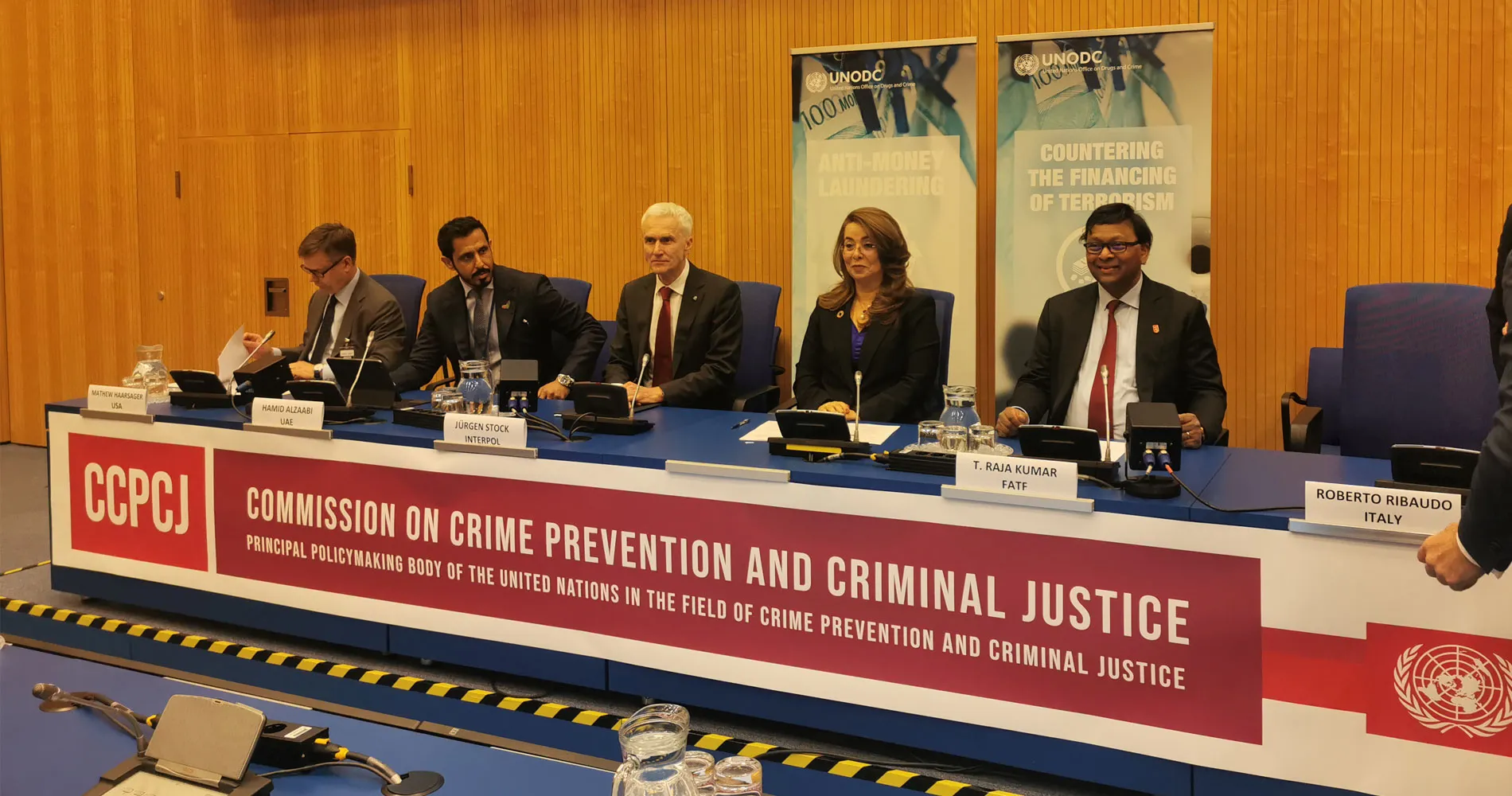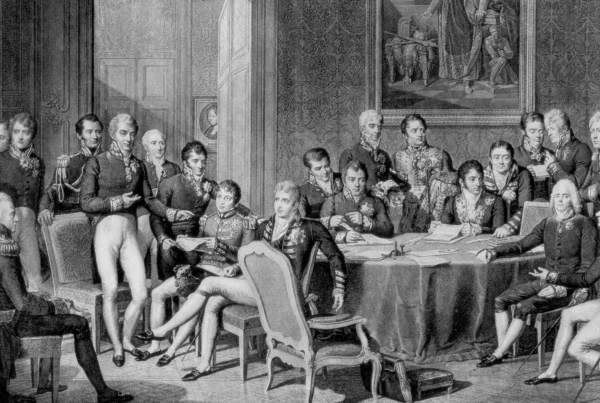The 33rd CCPCJ held at the Vienna International Center (VIC) from 13 to 17 May 2024 brought together delegates from UN Member States. The high-level conference tackled an enormous amount of subjects including cybercrime, money laundering, illegal drug trafficking, terrorism and corruption. Whereas many western Member States and their allies condemned Russia’s actions in Ukraine, only the Ambassador of Malaysia called out Israel’s genocide in Gaza. The World Wildlife Crime Report 2024 was also presented.
Diana Mautner Markhof
17 May 2024
Arabic version
Vienna hosted the 33rd Conference of the United Nations Commission on Crime Prevention and Criminal Justice (CCPCJ) on 13 to 17 May 2024 at the Vienna International Center, the third UN headquarters. The conference was opened by Ghada Waly, Executive Director of the UN Office on Drugs and Crime (UNODC). Member states agreed that a global effort is essential to combat transnational crime. Only through fostering international cooperation and strengthening legal frameworks can the international community successfully fight international criminal organizations which operate globally.
Topics on the agenda included: the need for an asset recovery protocol; illegal trafficking in forest products, wildlife and firearms; smuggling of commercial goods; combatting terrorism; anti-mafia laws; strengthening international responses and cooperation; migration and human trafficking; and fighting corruption. In addition, the rule of law and equal access to justice were on the agenda. Combating cybercrime and the use of information technology was a top priority at the conference, as were the sexual exploitation of children and the use of children by terrorist organizations.
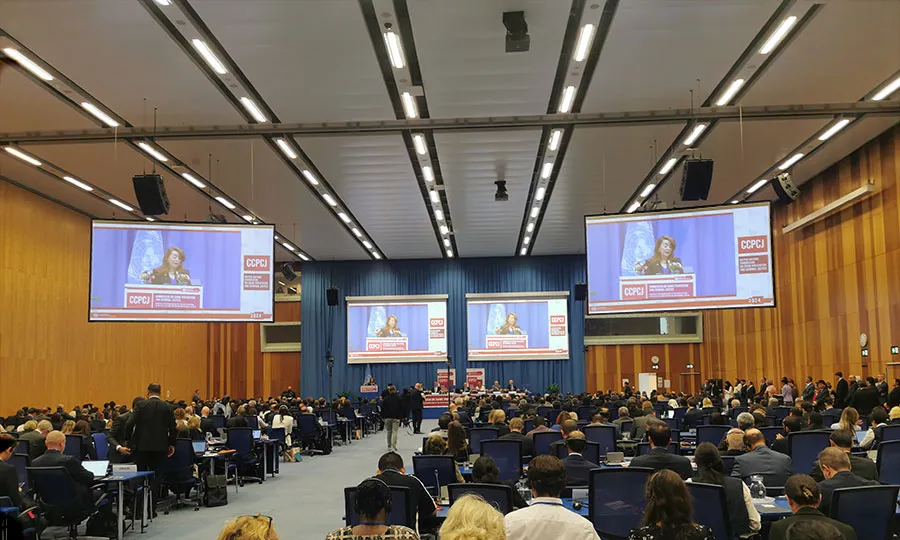
The representatives of regional groups stressed topics related to their regional interests. The EU condemned Russia’s aggression against Ukraine. The G77 plus China Group stated that terrorism should not be associated with a particular ethnicity or religion and took the opportunity to reiterate the underrepresentation of the developing world in UNODC. The Africa Group, represented by the Ambassador of Marroco H.E. Mr. Azzeddine Farhane, focused on the challenges faced by migratory movements on the African continent and the important role of the African Migration Observatory, an official organ of the African Union based in Morocco. The Group of Latin American countries appealed to member states to legally implement the United Nations Convention against Corruption (UNCAC) and for adequate funding of UNODC.
During the Opening Session, high level speakers made individual presentation. These included the Minister of Justice of Argentina, Justice Mariano Cúneo Libarona, who discussed the broad ranging judicial reforms in Argentina, the introduction of an oral and adversarial system and his plans for an overhaul of Argentina‘s anti-mafia law. Canada’s Attorney General, the Honorable Arif Virani, reaffirmed his country’s unwavering support for Ukraine and condemned the Russian aggression. In addition, he focused on upholding human rights and the need for a legally binding treaty to fight cybercrime. Canada hosted a side event on deepfakes and child safety.
Whereas many countries paid tribute to Ukraine and condemned Russia’s war of aggression, notably, the UK, Canada, Japan, The Netherlands and Albania, Israel’s genocide in Gaza was only mentioned by name by H.E. Ikram Bin Mohammad Ibrahim, the Ambassador Extraordinaire and Permanent Representative to the UN of Malysia. With the words „enough is enough“ he called for prosecuting any Member State found guilty of the crime of genocide. He made a vocal call of support for the creation of a Palestinian State.
The Secretary of the Department of the Interior of the Philippines, Benjamin de Castro Abalos Jr., pleaded for an enhancement of the criminal justice system and a rule-based order. The Philippines reaffirmed its bid for a non-permanent seat at the UNSC. The Philippines will continue its war against drugs. Philippine authorities have seized USD 587 million in illicit profits form drug trafficking in 2023. This represents a 700 percent increase from previous years.
Ambassador and Permanent Representative of Italy, H.E. Debora Lebre, stressed the need to follow the money. That is how Italy’s most famous mafia hunter, Judge Giovanni Falcone, fought against the mafia in the 1980s. He paid for his success with his life. Italy, together with the UAE and the US, hosted a high-level panel at the CCPCJ, on the topic „Taking the Profits out of Crime: Accelerating the Effective Implementation of Anti- Money Laundering and Countering the Financing of Terrorism Standards Globally“. The panel included T. Raja Kumar (FAFT), Ghada Waly (UNODC), Jürgen Stock (Interpol), Raffaele Grassi (Italy’s Deputy Chief of National Police), Ambassador Hamid Alzaabi (UAE) and Mathew Hasgragh (US-Treasury).
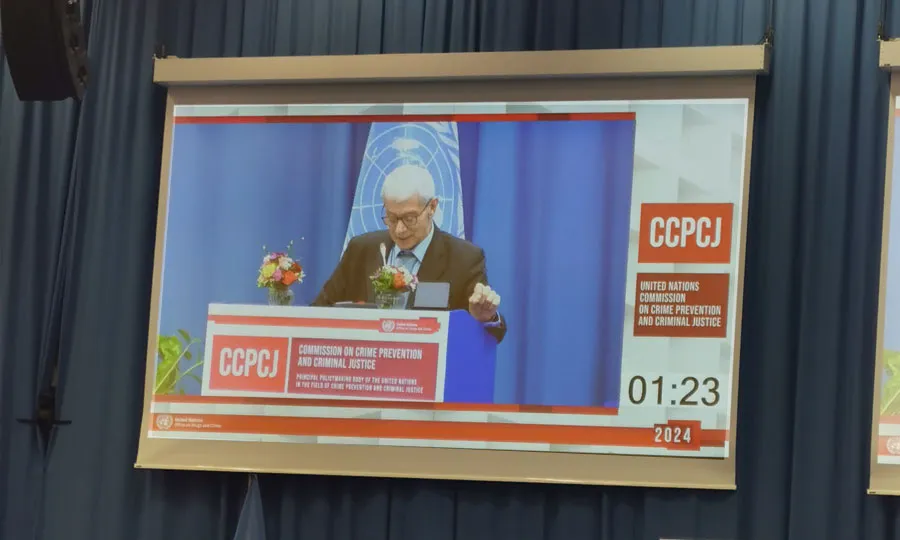
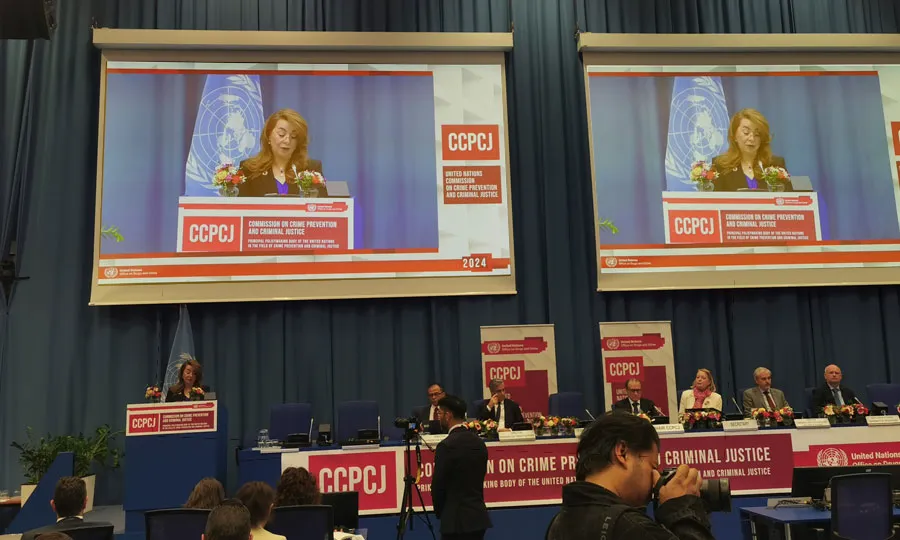
Vice Minister of Justice in China, Zhao Changhua, focused on the multiple crisis facing society and stressed the need to find common ground through shared innitiatives. He mentioned President Xi Jinping‘s focus on criminal law enforcement and the need for international cooperation. Currently China has concluded 172 international law treaties.
Peru‘s Ambassador Luis Alberto Campana Boluarte, highlighted the illegal trafficking in forest products and the smuggling of commercial goods. He focused on the criminal organizations involved in illicit mining, logging and trafficking directed against the flora and fauna of his country, and called for regional and multilateral cooperation and an action plan to protect the Andean community.
Speeches made by other high-level participants included the Permanent Representative of Mexico to the United Nations Office in Vienna, José Antonio Zabalgoitia Trejo, the Permanent Secretary of the Ministry of Justice of Thailand, Ms. Phongsaward Guyaroonsuith, Cuba’s First Deputy Minister of Justice Rosabel Gamón Verde who reiterated the island’s commitment to an effective battle against human trafficking, H.E. Ambassador Eglantina Gjermeni of Albania and the Permanent Representative of the Netherlands to the United Nations Office (Vienna), H.E. Mr. Albert Gierveld.
During the conference, the World Wildlife Crime Report 2024 was presented in a side event. The report concluded that wildlife trafficking persists worldwide despite two decades of concerted action at the international and national levels. There are signs of progress in reducing the impacts of trafficking for some iconic species such as elephants and rhinoceros, for which a combination of both demand and supply side efforts have yielded positive outcomes. However, despite this UNODC’s assessment provides no confidence that wildlife trafficking is being substantially reduced. Illegal trade continues in 162 countries and territories affecting around 4000 plant and animal species.
The Report highlighted the fact that wildlife crime also threatens the livelihood of local communities who depend on nature, whether as a source of income, employment, food, medicine or other valuable activities. It was agreed that strengthening the rule of law through fighting corruption, money-laundering and illicit financial flows is essential.


